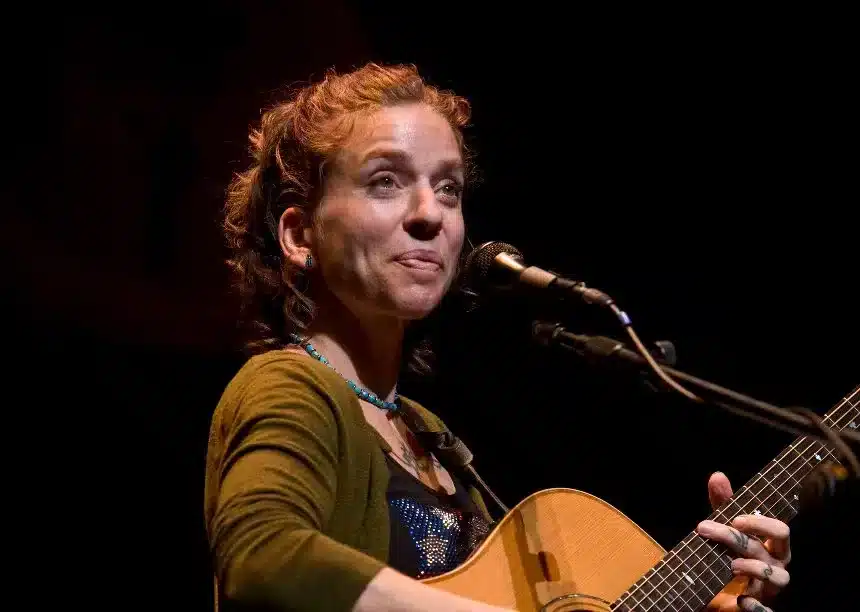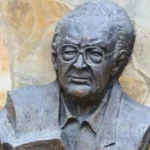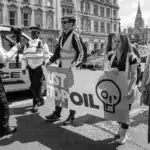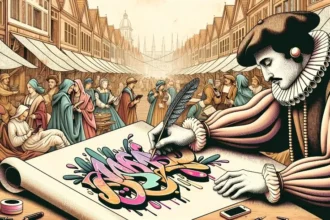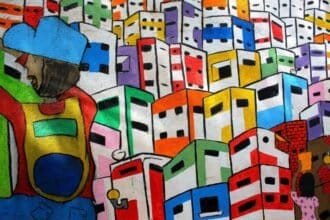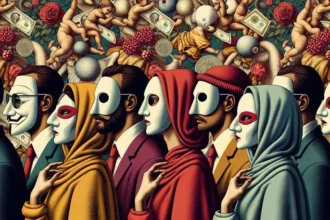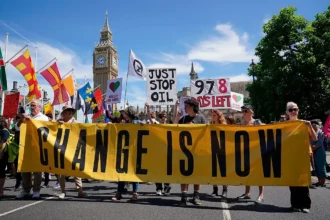In the symphony of social movements, political songs carry the resonant beat of change. Far from mere accompaniments, they are powerful catalysts that knit together the hearts and voices of the disenchanted. These anthems of resistance and echoes of defiance are central to the narrative of liberation. Political songs blend stirring melodies with compelling narratives, embodying the spirit of liberty itself.
As active agents of history, these songs do more than chronicle the fight for freedom; they fuel it. They forge a bond among individuals, transforming a scattered group into a unified force of political awakening. The true power of political songs lies in their ability to rally the spirits of those engaged in the struggle and to immortalize the pivotal moments of defiance. These melodies are the unsung champions of change, molded and enlivened by the collective voice that rises in a harmonious demand for justice.
Music’s potency in the choreography of protest is undeniable. Political songs are the vessels that carry the heart of resistance, melding ideology with melody, and broadcasting a movement’s soul. This aural medium surpasses the confines of spoken language, reaching directly into the emotional core of the community. It unites disparate voices into a melodious uprising, capable of standing shoulder to shoulder against tyranny.
Throughout history, political songs have been much more than aural comfort; they’ve acted as a spark for action. They function not as mere accompaniments but as dynamic instruments of awakening and encouragement. The oral tradition of political songs, in particular, safeguards the chronicles and the wisdom of historical battles, bequeathing the flame of rebellion to the hands of the future.
Amid the tumultuous times of the anti-apartheid struggle in South Africa, songs were the movement’s heartbeat.
Music’s tactical deployment at demonstrations and marches is designed to shatter the silence of complacency, fostering solidarity among the ranks of protestors. Such sonic disruptions are not simply interruptions of quietude but of submission, transforming each melody and word into a manifesto of dissent. Political songs transcends lyrical articulation; it is the audible architect of transformation, pulsating with the throng’s vitality, synchronizing individual heartbeats into a unified drumbeat of opposition.
Acknowledged by both grassroots campaigners and visionary leaders, the significance of political songs is intrinsic to the vigor of a freedom crusade. These songs, when voiced, construct the narrative of a campaign, thread by thread, until it rises as a standard for the masses to convene under. It’s the rhythm that captures the spirit of an age, mobilizing the average individual into an agent of change and inviting bystanders to step into the arena of activism. In essence, political songs resonate not merely as melodies but as the trumpet’s call to those determined to forge the light of a new day from the twilight of subjugation.
The Voice of Dissent
Political anthems rise above the realm of simple tunes and verses; they incarnate the dual essence of resistance and aspiration. These songs are forged not for amusement but for the stirring of consciousness, the challenging of existing norms, and the consolidation of the solitary into a collective force. The anti-apartheid crusade in South Africa stands as a testament, where melodies were both the spur to action and emblems of shared identity. Dignitaries like Desmond Tutu have conceded that devoid of these musical sinews, the journey toward liberation might have been fraught with greater violence.
Within such frameworks, songs frequently bear clandestine meanings, operating as covert channels for communication beneath the scrutiny of authoritarian governance. The Chilean resistance under Pinochet’s tyranny, with artists such as Victor Jara masking dissent within allegory, exemplifies this. Hence, the political song morphs from a mere element of culture into an apparatus for insurrection and mobilization. It avails a form of articulation that is simultaneously collective and intimately personal.
Moreover, these anthems persist, transcending the finite existence of the conflicts that gave rise to them. They reverberate with the echoes of bygone triumphs and defeats, schooling the progeny in the potency of solidarity and the strength of a united chorus. In this manner, political songs bequeath a legacy, a continuous thread weaving through the tapestry of history, connecting past movements to contemporary and future activism. Therefore, political songs not only encapsulate the struggle’s core but evolve into an everlasting medium for the articulation of political identity and sentiment.
The power of political songs lies in its capacity to distill intricate political ideologies into an accessible, emotive medium.
The tradition of lifting voices in song amidst strife serves as a potent assertion of both individuality and opposition. Political songs stand as sonic testaments to tenacity, pulsating in harmony with a movement’s spirit. Consider the music of the American Civil Rights Movement, where spirituals such as “We Shall Overcome” morphed into rallying cries that echoed a shared desire for fairness and justice. These were not mere fads of the era but potent symbols of pacifistic resistance, bolstering the protesters’ determination and broadcasting their plea across the globe.
In the arena of social change, music becomes a universal stage for political involvement. It equalizes the act of protest, granting voices from every social echelon a chance to amplify the common outcry. Such inclusiveness is crucial; it dissolves the walls erected by illiteracy and education, championing a universal medium of articulation that oftentimes speaks louder than written declarations or orations. The emotive power of a tune can articulate sentiments that prose cannot, invoking a bond with the intrinsic human condition.
Furthermore, the cadence and chorus inherent in these melodies create a community, pivotal for buoying spirits amidst extended adversities. Thus, the rhythm of emancipation aligns with the very identity of the subjugated, a standard they carry forth. It embodies their dreams, indignations, and anticipations, transforming personal anguish into a collective odyssey. Hence, political songs transcends performance; it is both an existential and communal experience, searing itself into the narrative of a community’s chronicle and its quest for freedom.
Political Songs as Tools of Empowerment and Solidarity
Political songs frequently ascend beyond basic tunes to stand as potent instruments of empowerment. They rally communities, providing a shared vernacular for resistance and hope. Amid the tumultuous times of the anti-apartheid struggle in South Africa, songs were the movement’s heartbeat. They forged unity among diverse factions, united against a shared foe. Figures like Desmond Tutu heralded these songs not merely as artistic output but as vital to the movement’s victory. Their potency was rooted not just in evoking emotions but also in solidifying the resolve for the cause.
The enduring reverberations of political songs bear witness to music’s instrumental role in societal metamorphosis.
In this setting, the chorus of political songs echoed beyond ethnic divides, offering solace to the fatigued and a voice to the muted. The phenomenon was not just art mirroring life but art influencing the trajectory of political defiance. Songs acted as conduits of communication, broadcasting messages of rebellion and unity across communities often scattered and under watch. The solidarity crafted by these shared hymns built resilience and a common identity, shaping a mode of protest that was as inclusive as it was formidable.
Ronnie Kasrils referred to music as a tangible weapon against apartheid. The image of individuals singing in unison, arm in arm, epitomizes music’s role as a great equalizer. It dismantled divisions, empowering everyone, irrespective of their social status or literacy, to join the struggle. This democratic facet of political songs highlights their significance in liberation movements globally, echoing a universal longing for autonomy and justice. Within the refrains of resistance, every voice found its harmony, amplifying the collective determination for transformation.
Political Songs as Catalysts for Change
The term “political songs” encompasses more than the essence of defiance; it amplifies the collective voice of those yearning for justice. This was poignantly displayed during the civil rights era in the United States, where songs not only articulated a longing for equality but rallied the community into action. These melodies, reverberating through marches and gatherings, transcended performance art to become potent calls to arms, lifting the spirits of the campaigners and presenting their cause to the world with compelling resonance.
Political songs stand not only as a testament to historical struggles but as vital, living instruments in the quest for democratic expression.
Just as the songs of South Africa’s anti-apartheid movement united disparate voices, the anthems of the civil rights movement offered a sonic emblem for people of diverse origins to stand together. These songs became the vehicle for the transmission of stories—narratives of hardship and victory—interweaving personal histories into a shared fabric of memory. The power of political songs lies in its capacity to distill intricate political ideologies into an accessible, emotive medium. This transfiguration is the hallmark that renders these songs crucial for political enlightenment and community mobilization.
In the tapestry of political strife, music stands as a beacon of human ingenuity in the face of oppression. When voices are stifled, they can still rise in harmony, echoing leaders like Desmond Tutu’s acknowledgments of their significance. These freedom hymns act as a repository and inspiration, chronicling a populace’s march toward emancipation while igniting the flame for ongoing human rights battles. The enduring reverberations of political songs bear witness to music’s instrumental role in societal metamorphosis—a force that not only recounts but also actively forges the narrative of history.
Political Songs in Education and Mobilization
Political songs surpass mere accompaniment to protests and become pivotal in educating and raising consciousness. This cultural medium renders intricate political concepts into a dialect that vibrates with the populace. In the sphere of education, political songs morph into tools that enlighten and captivate students, delving into the depths of social movements’ histories and tactics.
The infusion of these tunes into academic curricula across the globe has proven invaluable in demonstrating the tenets of civil disobedience and the power of nonviolent resistance. They provide stories that do more than just recount events; they embolden and enlighten, creating a bridge of empathy and unity among learners. This pedagogical role underscores the significance of political songs in forging the political acumen of emerging generations.
Beyond the classroom, political songs serve as beacons in the mobilization of communities, urging engagement in the democratic fray. Whether spurring voter education initiatives or driving policy reform campaigns, the melody and words embed themselves in the collective memory, sustaining political involvement. It’s through this captivating modality that political songs help cultivate an informed, proactive citizenry, primed to influence the direction of their communities. Thus, political songs stand not only as a testament to historical struggles but as vital, living instruments in the quest for democratic expression.
Conclusions: The Reverberations of Political Songs
Political songs reverberate as profound affirmations of unyielding dissent and unity. These compositions are more than mere melodies; they are vibrant forces that have profoundly influenced the mobilization and triumphs of political movements. Infused with resilience and aspiration, these songs have woven individual voices into a robust mosaic of concerted action.
Icons of resistance and combatants in the fight against tyrannies, like apartheid, have borne witness to the role of political songs—not just as companions in strife but as potent nonviolent weapons against suppression. They have served as instruments of solidarity and motivation, fortifying the spirits of many and propelling the drive necessary for transformative upheaval. This affirms that the power of songs transcends their tunes, embodying the collective spaces for expression they forge and the liberties they claim.
Adapted from an academic article for a wider audience, under license CC BY 4.0


